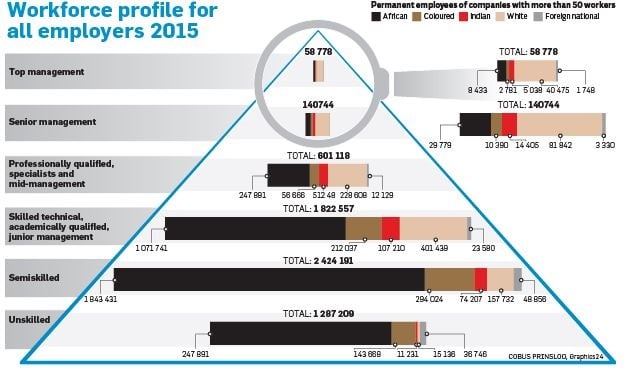The odds are you will have a white boss for at least the next 20 years.
The rate at which black people are displacing whites at the top of the job ladder will only achieve a 50-50 split between black and white “top managers” in the country by 2036, according to City Press calculations.
The sheer number of white people at the top means that even if all the country’s employers froze the number of white bosses, they would still be the majority until 2030.
The release of the 16th annual report from the Commission for Employment Equity this week evoked the same reaction that the 15th report did before it: shock at white dominance in the upper end of the job market.
So-called top management is 68.9% white across the state and private sectors, which is less than before, but still astonishing 22 years after apartheid.
White dominance is falling – but very slowly.
If the inflow of top managers at all the employers captured in the report somehow matched the racial profile of South Africa’s economically active population, the fall of white dominance will come in 2033.
That is if the net inflow into top management is 10% white, 77% African, 10% coloured and 3% Indian.
Labour Minister Mildred Oliphant this week argued that the apparently high rate of white attrition illustrates white mobility between jobs at different employers.
Oliphant this week promised that employers who did not comply with the Employment Equity Act would be given six months “to rectify the situation before the might of the law takes its course”.
According to Oliphant’s spokesperson, Sithembele Tshwete, this six months refers to a planned series of road shows that the Commission for Employment Equity will embark on, starting in June.
“At the end of this period she [the minister] will receive a report from the commission that will give her a good picture on what the issues are around noncompliance,” said Tshwete.
Tshwete could this week not confirm exactly what employers stand accused of not complying with.
Up until 2014, the potential penalties were restricted to fines of up to R900 000.
An amendment to the law introduced revenue-based fines ranging from 2% to 10%, technically creating a vastly larger stick. That stick is, however, practically never used.
Despite being in place for almost 20 years, the Employment Equity Act has resulted in almost no prosecutions or fines for noncompliance.
There are, however, three well-known cases, two of which resulted in fines. Both fines were imposed on Chinese-owned clothing factories in Newcastle in 2005 and 2007, respectively.
The department went to the labour court to impose a fine on Comair in 2009, but the court sided with the airline operator and British Airways franchisee that is responsible for Kulula.com.




 Publications
Publications
 Partners
Partners









